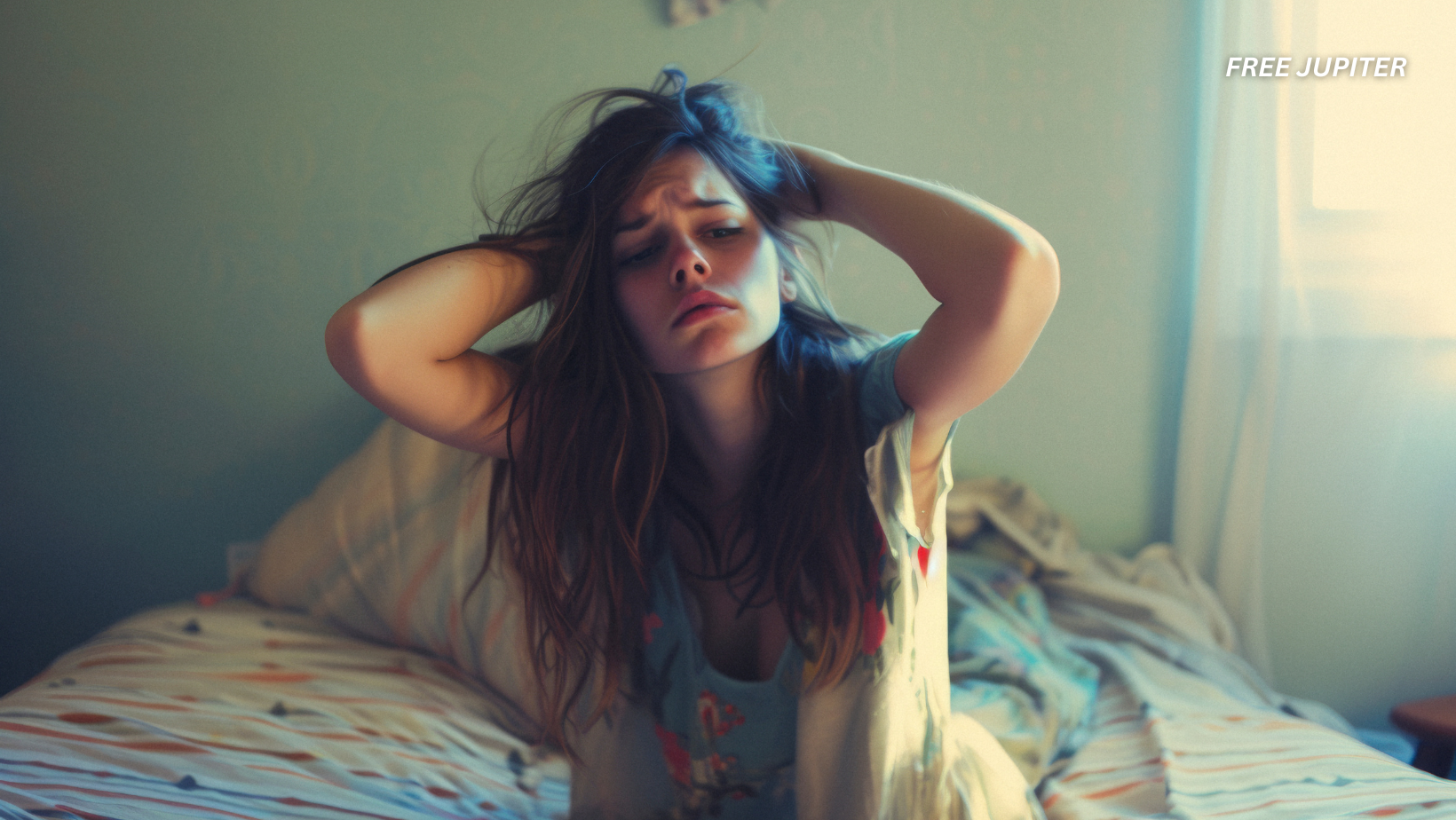For as long as most of us can remember, we’ve been told that the magic number for a healthy night’s rest is eight hours. Get less than that, and you’re officially “sleep-deprived.” Get more, and you’re supposedly “oversleeping.” Many people wear their eight hours like a badge of honor, boasting, “I always get my full night’s rest.”
But here’s the catch: sometimes you can sleep from 10 PM to 6 AM, check the box for a “perfect” eight hours, and still wake up feeling like you’ve been hit by a train. That groggy heaviness, the need for three cups of coffee before you can function, the sluggish brain fog—it doesn’t match the math you’ve been told to trust.
The truth is that sleep is not just about quantity—it’s about quality. You can clock eight hours in bed, but if your body isn’t cycling through sleep in the right way, or if something else is disrupting your rest, you’ll still wake up tired. In fact, exhaustion after a full night’s sleep is your body’s way of waving a giant flag, telling you something’s off.
Let’s take a deeper look at nine reasons why you may feel exhausted even after eight hours of shut-eye—and what your body could be trying to tell you.
1. Your Sleep Cycles Are Out of Sync
Imagine sleep as a carefully choreographed dance. You’re supposed to glide smoothly from light sleep into deep, restorative stages, then into REM (dream sleep), and back again. These cycles last about 90 minutes each, and you need four to six complete rounds for true recovery.
But here’s the problem: your body doesn’t always dance gracefully. Stress, alcohol, blue light from phones and TVs, caffeine too late in the day, or even an uncomfortable mattress can interrupt this rhythm. Instead of flowing smoothly from stage to stage, your brain keeps stumbling, breaking up the cycles.
This is why you can technically “sleep” for eight hours but wake up exhausted. Sleep experts often call it “junk sleep”—it looks like rest on paper, but it doesn’t recharge you.
👉 What you can do: Stick to a consistent bedtime routine, dim screens before bed, and make sure your sleeping space is comfortable and cool. Sometimes, it’s not about sleeping longer—it’s about protecting the quality of the sleep you already get.
Read more: The Ability to Detect Sarcasm May Signal a Healthy Brain
2. Your Breathing Isn’t Smooth at Night
Even if you don’t snore loudly, you might have mild sleep apnea or other breathing issues that quietly disrupt your rest. During apnea, your airway narrows or briefly collapses, forcing your brain to jolt you awake—sometimes dozens of times an hour. These micro-awakenings are so brief that you don’t remember them, but they scatter your sleep cycles and leave you groggy.
People with sleep apnea often wake with morning headaches, sore throats, or dry mouths. Others simply feel tired no matter how early they went to bed.
👉 What you can do: Try sleeping on your side, use pillows that support your airway, or check with a doctor if you suspect breathing issues. Even small adjustments can improve oxygen flow and help you feel more rested.
3. You’re Dehydrated Without Realizing It
During eight hours of sleep, your body naturally loses water through breathing and sweating. On average, that’s close to a liter gone by morning. If you’re not properly hydrated before bed—or if your bedroom is too warm or dry—you’ll wake up mildly dehydrated, which mimics fatigue almost perfectly.
That’s why mornings sometimes feel heavy, stiff, and foggy even if you’ve technically “rested.”
👉 What you can do: Sip a glass of water before bed (not too much, so you don’t interrupt sleep with bathroom trips). Keeping a cool, slightly humid environment can also prevent nighttime dehydration.
4. Your Blood Sugar Is Playing Tricks on You
Your body doesn’t stop processing food just because you’re asleep. If you head to bed after a sugary snack, your blood sugar rises, then drops sharply during the night. That drop signals your body to release cortisol and adrenaline—the same hormones that wake you up in the morning. But if they surge at 3 AM, your sleep becomes fractured, leaving you tired at sunrise.
The opposite is also true: going to bed hungry can cause dips that trigger the same stress response.
👉 What you can do: Opt for a small, balanced snack in the evening—something with complex carbs and protein, like a slice of whole-grain toast with nut butter or yogurt with berries. This helps keep your blood sugar steady until morning.
Read more: 9 Harsh Truths You Won’t Know Until After You Get Divorced
5. Stress Hormones Are Out of Rhythm
Cortisol, the body’s primary stress hormone, follows a natural rhythm: it should be lowest at night (to let you sleep) and peak in the morning (to help you wake up). But if you’re stressed, anxious, or overthinking, that rhythm flips. You go to bed wired and wake up sluggish.
This “inverted cortisol rhythm” is surprisingly common and explains why people under chronic stress often feel like zombies in the morning, even if they technically got enough sleep.
👉 What you can do: Develop a calming bedtime routine. Stretching, journaling, breathing exercises, or meditation can help lower nighttime cortisol. Over time, this retrains your body to follow its natural rhythm.
6. Your Body Is Fighting Hidden Inflammation
Sometimes your fatigue isn’t about sleep at all—it’s about your immune system. Low-level inflammation caused by food sensitivities, allergies, or even chronic health conditions can leave your body fighting battles all night long. Instead of resting, your immune system is busy working overtime, leaving you drained in the morning.
You might not notice the inflammation directly, but common signs include bloating, skin flare-ups, or that constant “puffy” feeling upon waking.
👉 What you can do: Pay attention to how you feel after eating certain foods. If symptoms line up with fatigue, it may be worth testing for food sensitivities or allergies. Anti-inflammatory practices—like eating more whole foods, reducing processed sugars, and adding spices like turmeric—can also help.
7. Hormones Beyond Cortisol Are Out of Balance
Melatonin signals to your brain that it’s time for sleep, while thyroid hormones, reproductive hormones, and insulin all influence energy and metabolism. If these fall out of balance—whether from stress, lifestyle habits, or underlying conditions—you may sleep through the night and still feel like you never rested.
Women, in particular, may notice changes in sleep around hormonal shifts such as menstruation, pregnancy, or menopause.
👉 What you can do: Keep an eye on patterns in your fatigue, and don’t dismiss hormonal health. Sometimes, what looks like “bad sleep” is really a hormonal imbalance in disguise.
8. Your Sleep Environment Is Working Against You
Light leaking through curtains, a room that’s too hot, or even the wrong pillow can all prevent your brain from sinking into deep rest. Sleep thrives on darkness, cool air, and quiet. When your environment doesn’t support that, your brain stays partially alert all night.
👉 What you can do: Aim for a dark, cool, and comfortable sleep space. Blackout curtains, a fan, or simply adjusting your bedding can make a surprisingly big difference.
9. Your Body Clock Is Off Schedule
Your circadian rhythm—the body’s internal clock—runs the show when it comes to sleep. If you force yourself into a routine that doesn’t match it (like waking up at 5 AM when your body prefers 7 AM), you may get the hours but still feel drained.
Shift workers and people who travel frequently know this all too well. Even if you count eight hours, it’s not the same as sleeping in sync with your body’s natural rhythm.
👉 What you can do: Try to keep consistent sleep and wake times, even on weekends. Expose yourself to natural light in the morning to help set your internal clock. Over time, your body learns when it’s supposed to be asleep and when it’s supposed to be awake.
Read more: 12 Signs Someone Isn’t Drinking Enough Water, Backed by Research
The Bottom Line
Waking up exhausted after eight hours of sleep isn’t a personal failure—it’s your body sending a signal. From stress to hydration, blood sugar swings to hidden inflammation, there are countless reasons why your “perfect” night of sleep doesn’t leave you feeling restored.
The key is not just chasing a number of hours but listening to your body’s clues. Sleep is more than time in bed—it’s a delicate conversation between your brain, body, and environment. When that conversation gets interrupted, exhaustion is often the only language your body has left.
Featured image: Freepik.
Friendly Note: FreeJupiter.com shares general information for curious minds. Please fact-check all claims and double-check health info with a qualified professional. 🌱










